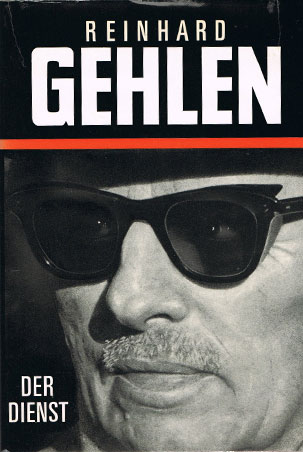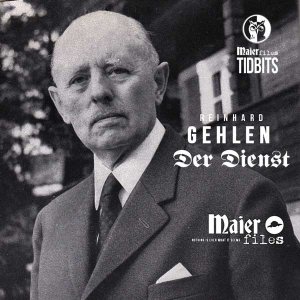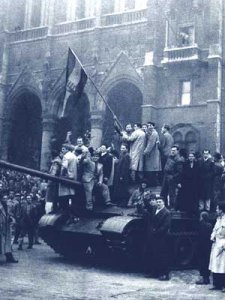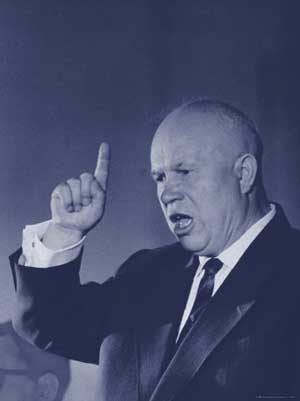
For those who are familiar with the Maier files already know that the BND and the secret services are playing a significant role in the huge storyline.If you thirst for knowledge, if you want to know the answers, if you are tired of relying simply on what you have been told, then go to the headwaters, dip your face in the pool, and drink deep.
So, General Reinhard Gehlen’s memoirs is a good start, an excerpt from his memoirs titled “Der Dienst – Errinerungen” …. (The Service)
Reinhard Gehlen:
“I have hesitated a long time before deciding to include in this book any chapters on the work of the Federal Intelligence Service -BND, Bundesnachrichtendienst- itself. For twenty-six years I occupied a senior position in Germany’s various intelligence services, and for the last twenty-two years I was head if the Gehlen organization and of the BND that succeeded it. Many world events left their mark on the twelve years in which I headed Germany’s foreign intelligence service.
Dramatic years
Both these events and the work of our organization have remained indelible in memory; so it has not been easy to make a selection from the superabundance of impressions, from the ups and downs of many dramatic years.

One feature distinguishes me from the small number of authors who have written about my organization: I know the true facts in all their details. For that reason many readers will expect me to narrate certain well-known episodes in far greater detail than they have learned from published sources so far.
They expect me to correct previous versions of incodents which have been by design or ignorance wrongly reported hitherto, which a consequent public controversy and loss of confidence in the service.
Permanent crisis zones
While respecting the proper limits on what I may reveal, I will narrate a few particularly important events as they occurred and the part played in them by my service. Nearly all the episodes I will describe belong, as is only natural, to the grand conflict between communism and the free world. Virtually all of them have their backdrop areas which I-regarding them from a purely intelligence viewpoint-term “permanent crisis zones”: Central Europe, with the special conditions created by the division of Germany and the isolation of Berlin, Eastern Europe, its recent history scarred by bloody uprisings in the name of national liberation and the brutal Russian measures of repression; the Middle East, a theater of latent tensions which has twice forced the world to hold its breath, in 1956 and at the beginning of the 1970s.
Vietnam
Asia where the Vietnam War has followed that in Korea, and where Red China has steadily increased in influence, and central America, where, in Cuba, the communists have succeeded in establishing a base from which to subvert the whole of Latin America, and which can be expanded into a military bridgehead from which to launch an assault on the United States at any time the political situation may call for it. And, meanwhile, there are indications of new sources of unrest in South America, among which must be counted the steady conversion of Chile into a base for Soviet foreign policy.
Original text
Bei der Vorbereitung dieses Buches, das dem Dienst gewidmet ist, have ich lange gezögert, ein Kapitel ueber die Taetigkeit des BND selbst zu schreiben. Sechsundzwanzig Jahre durfte ich an leitender Stelle im Nachrichtendienst wirken, davon 22 Jahre als Leiter der “Organisation Gehlen” und Chef des aus ihr hervorgegangenen Bundesnachrichtendienstes. Die 12 Jahre an der Spitze des deutchen Auslandnachrichtendienstes waren wie alle vorhergehenden von weltpolitischen Geschehnissen gepraegt, die mir genau so lebendig in Erinnerung geblieben sind wie die Taetigkeit des Dienstes in dieser Zeit.
Es ist mir schwergefallen, aus der Ueberfuelle der Eindruecke, aus Höhen und Tiefen bewegter Jahre, die begleitet waren von vielen Erfolgen, aber auch von manchen Rueckschlaegen, eine Auswahl zu treffen. Wie meinen Partnern und Kollegen – ich denke hier in erste Linie an Allan Dulles – muss ich es auch mir versagen, Einzelheiten ueber geheime Auslandoperationen des Dienstes zu berichten.
Noch Jahre danach kann eine solche Preisgabe operationeller Zusammenhaenge und Abläufe fremden Nachrichtendiensten wichtige Erkenntenisse vermitteln und schweren Schaden nach sich ziehen. Andererseits war und bin ich mir bewusst, dass viele Leser von mir Aussagen und Stellungnahmen erwarten, die ueber das hinausgehen, was aus Veröffentlichungen bisher bekannt wurde. Es ist naheliegend, dass hierbei auch an Richtigstellungen zu Vorgängen gedacht wird, die, bewusst oder aus Unkenntnis falsch dargestellt, die Oeffentlichkeit irritiert und das Vertrauen in den Dienst voruebergehend gefährdet hatten.
Unter Wahrung der gebotenen Einschränkungen habe ich mich darfuer enstschieden, einige mir besonders wichtig erscheinende Ereignisse in chronologischer Folge zu schildern und damit verbundenen Aufträge an den Dienst mit einzelnen Ergebnissen anzufuehren, soweit dies vertreten werden kann. Ich weiss, dass meine oft sehr behutsame Darstellung manchen besonders interessierten Leser nicht ganz zufriedenstellen wird. Indes bin ich mir jedoch gerade in diesem Punkt des Verständnisses all derer sicher, die sich fuer unser Land einen leistungsfähigen Auslandsnachrichtendienst wuenschen.
Bei der nachfolgenden Auswahl der politischen und militärischen Geschehnisse habe ich mich nach den Schwerpunkten der weltpolitischen Entwicklung zu richten versucht. Nahezu alle von mir behandelten Vorgänge gehören deshalb wie sekbstverständlich in den grossen Zusammenhang der Auseinandersetzung zwischen der freien und der kommunistischen Welt.
Und fast alle spielten sich in jenen Räumen ab, die ich aus nachrichtendienstlicher Sicht die “permanenten Krisenzonen” genannt habe: In Mitteleuropa zuerst, mit der besonderen Situation des geteilten Deutschland und der Insellage Berlins; daneben is Osteuropa, dessen juengste Geschichte von dem verzweifelten Ringen der Völker um Freiheit und den gewaltsamen Unterdrueckungsmassnahmen der Sowjets zur Behauptung ihres Machtbereiches bestimmt wird; im Nahen Osten, der als latentes Spannungsfeld die Welt im Jahre 1956 ebenso in Atem gehalten hat wie beim Uebergang in die 70er Jahre; in Asien, wo es nach Korea zum Vietnam-Krieg kam und sich die Macht der Volksrepublik China ständig weiterentwickelte; in der Mitte Amerikas schiesslich, wo es in Kuba gelang, eine kommunistische Basis fuer die Infiltration Lateinamerikas aufzubauen, die später je nach der politischen Konstellation auch als militärische Basis gegen die USA ausgebaut werden kann. Inzwischen zeichnen sich in Suedamerika neue Krisenherde ab, zu denen seite längerer Zeit die Entwicklung Chiles zu einem Stuetzpunkt der Sowjetpolitik gehört.

Hungary and the Suez Canal
The events in Hungary and on the Suez Canal were the first real tests for the new Federal Intelligence Service. I have therefore related them before and event which, more than any other, decided the international flavor of the 1950s. This was the ceremonial launching of the dangerous Russian policy of “peaceful coexistence”, which began to take itself felt during that crisis year of 1956.
Ours was the first, and so far as I know only, intelligence service to obtain a complete transcript of Nikita Khrushchev’s secret speech to the Twentieth Party Congress on February 25, 1956. In it, the Communist party leader announced what he described as a new policy toward the Soviet Empire and her neighbors. According to him, peaceful coexistence would lead not only to a relaxation of the permanent confrontation between the power blocs of East and West but would also guarantee a future in which they could live together without fear or strife.
Unity of Nations
It was not long before it became clear that all these promising noises were nothing more than the familiar Soviet ploy of embracing the enemy and softening him up for the final kill, as Lenin had always advocated. While outwardly the Russians continued to propagate this principle of “UNITY OF NATIONS” at the same time they rearmed their forces for the resumption of the conflict between the world’s power systems-but using other methods and other means.
Thus, they were absolutely honest when they ruled that peaceful coexistence could not be extended to the ideological plane; and they made no attempt to conceal that the purpose of this new policy was to set suspicious minds at rest and make the public in non-Communist countries more receptive to Soviet propaganda than it had been so far.

Communist machine
The whole complex Communist machine throughout the world was called on to support Soviet foreign policy under this new slogan of “peaceful coexistence.” It was hardly surprising that there were governments, as well as individuals, that accepted the new Moscow message at its face value and put their faith in it. The Russians seemed to be achieving their first aims almost without effort.
Khrushnev
But Khrushnev’s speech was immediately subjected to detailed analysis by Soviet experts we employed, and they concluded that the danger to the free world was now greater than ever. I warned many of our correspondents abroad of the results of our analysis and the grim consequences of accepting Khrushchev’s slogans. The experts among them had already reached the same conclusions themselves, but in West Germany there were many people who were reluctant to heed our warnings. They regarded us all as incorrigible “cold-warriors.” Many were as entranced by this Soviet slogan of peaceful coexistence as a rabbit that has been hypnotized by a snake.
Hungarian uprising
It was only when the Soviets eight months later smashed the Hungarian uprising with brute force that it became plain to even the most die-hard optimist that contrary to Khrushchev’s promises the Russians were not prepared to extend their much publicized “peaceful coexistence” to their own sphere of influence. Seldom has a lie been so swiftly exposed. It is incomprehensible that most people have managed to obliterate these tragic events from their memories so quickly – just as they have already virtually forgotten the Soviet invasion of Czechoslovakia in 1968.
Reinhard Gehlen
Der Dienst – Erinnerungen 1942 -1971 (German Edition)



